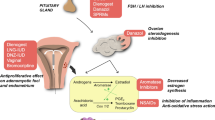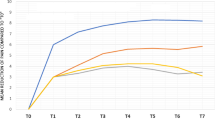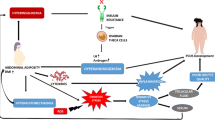Abstract
Objective
Several randomized controlled trials (RCTs) have investigated the use of probiotic/synbiotic in PCOS patients, without clarifying the real use in clinical practice. The aim of this meta-analysis was to evaluate the effectiveness of probiotics and synbiotics on metabolic, hormonal and inflammatory parameters of PCOS.
Methods
Electronic databases (MEDLINE, Scopus, EMBASE, ScienceDirect, The Cochrane Database of Systematic Reviews and ClinicalTrials.gov) were searched from their inception until May 2019. The study protocol was registered in PROSPERO with number CRD42018111534. Randomized controlled trials (RCTs) of PCOS’s women undergoing therapy at least 8 weeks with probiotics or synbiotics or without therapy were included. The primary outcomes were changes in anthropometric parameters, glucose/insulin metabolism, lipid profile, sex hormones profile, inflammation markers.
Results
587 patients were included in nine RCT. The administration of probiotic/synbiotic were associated with a significant improvement in FPG, FBI, HOMA I-R, BMI. It also modified Ferriman-Gallway, serum triglycerides, serum testosterone, hs-CRP, NO, TAC, GSH, and MDA. Subgroup analysis of the type of intervention showed that probiotics were associated with greater testosterone and FPG reduction; synbiotics administration resulted in a more pronounced decrease of the FBI. Subgroup analyses on the duration of therapy showed that, probiotic/synbiotic administration had a significantly greater effect on QUICK-I in the case of women with 12-weeks of therapy than in the 8-weeks therapy group. Nevertheless, we did not observe any significant difference was observed in terms of FBI, HOMA-IR, and FPG.
Conclusions
Probiotics and synbiotics seem to either an effect on/influence metabolic, hormonal and inflammatory parameters, or can influence them. Consequently, it could lead to an improvement of fertility in PCOS.




Similar content being viewed by others
Change history
11 March 2022
A Correction to this paper has been published: https://doi.org/10.1007/s00394-022-02856-5
References
Thessaloniki ESHRE/ASRM-Sponsored PCOS Consensus Workshop Group (2008) Consensus on infertility treatment related to polycystic ovary syndrome. Hum Reprod 23(3):462–477
Duleba AJ, Dokras A (2012) Is PCOS an inflammatory process? Fertil Steril 97(1):7–12
Farrell K, Antoni MH (2010) Insulin resistance, obesity, inflammation, and depression in polycystic ovary syndrome: biobehavioral mechanisms and interventions. Fertil Steril 94(5):1565–1574
Clemente JC, Ursell LK, Parfrey LW, Knight R (2012) The impact of the gut microbiota on human health: an integrative view. Cell 148(6):1258–1270
Gensollen T, Iyer SS, Kasper DL, Blumberg RS (2016) How colonization by microbiota in early life shapes the immune system. Science 352(6285):539–544
Cani PD, Amar J, Iglesias MA, Poggi M, Knauf C, Bastelica D et al (2007) Metabolic endotoxemia initiates obesity and insulin resistance. Diabetes 56(7):1761–1772
Kau AL, Ahern PP, Griffin NW, Goodman AL, Gordon JI (2011) Human nutrition, the gut microbiome and the immune system. Nature 474(7351):327–336
Maranduba CM, De Castro SB, de Souza GT, Rossato C, da Guia FC, Valente MA et al (2015) Intestinal microbiota as modulators of the immune system and neuroimmune system: impact on the host health and homeostasis. J Immunol Res 2015:931574
Guo Y, Qi Y, Yang X, Zhao L, Wen S, Liu Y et al (2016) Association between polycystic ovary syndrome and gut microbiota. PLoS ONE 11(4):e0153196
Moreno-Indias I, Sanchez-Alcoholado L, Sanchez-Garrido MA, Martin-Nunez GM, Perez-Jimenez F, Tena-Sempere M et al (2016) Neonatal androgen exposure causes persistent gut microbiota dysbiosis related to metabolic disease in adult female rats. Endocrinology 157(12):4888–4898
Tremellen K, Pearce K (2012) Dysbiosis of gut microbiota (DOGMA)—a novel theory for the development of polycystic ovarian syndrome. Med Hypotheses 79(1):104–112
Lindheim L, Bashir M, Munzker J, Trummer C, Zachhuber V, Leber B et al (2017) Alterations in gut microbiome composition and barrier function are associated with reproductive and metabolic defects in women with polycystic ovary syndrome (PCOS): a pilot study. PLoS ONE 12(1):e0168390
Torres PJ, Siakowska M, Banaszewska B, Pawelczyk L, Duleba AJ, Kelley ST et al (2018) Gut microbial diversity in women with polycystic ovary syndrome correlates with hyperandrogenism. J Clin Endocrinol Metab 103(4):1502–1511
Barazzoni R, Deutz NEP, Biolo G, Bischoff S, Boirie Y, Cederholm T et al (2017) Carbohydrates and insulin resistance in clinical nutrition: Recommendations from the ESPEN expert group. Clin Nutr 36(2):355–363
Roberfroid M, Gibson GR, Hoyles L, McCartney AL, Rastall R, Rowland I et al (2010) Prebiotic effects: metabolic and health benefits. Br J Nutr 104(Suppl 2):S1–63
Higgins JP, Thompson SG (2002) Quantifying heterogeneity in a meta-analysis. Stat Med 21(11):1539–1558
Karimi E, Moini A, Yaseri M, Shirzad N, Sepidarkish M, Hossein-Boroujerdi M et al (2018) Effects of synbiotic supplementation on metabolic parameters and apelin in women with polycystic ovary syndrome: a randomised double-blind placebo-controlled trial. Br J Nutr 119(4):398–406
Karamali M, Eghbalpour S, Rajabi S, Jamilian M, Bahmani F, Tajabadi-Ebrahimi M et al (2018) Effects of probiotic supplementation on hormonal profiles, biomarkers of inflammation and oxidative stress in women with polycystic ovary syndrome: a randomized, double-blind, placebo-controlled trial. Arch Iran Med 21(1):1–7
Ahmadi S, Jamilian M, Karamali M, Tajabadi-Ebrahimi M, Jafari P, Taghizadeh M et al (2017) Probiotic supplementation and the effects on weight loss, glycaemia and lipid profiles in women with polycystic ovary syndrome: a randomized, double-blind, placebo-controlled trial. Hum Fertil (Camb) 20(4):254–261
Shoaei T, Heidari-Beni M, Tehrani HG, Feizi A, Esmaillzadeh A, Askari G (2015) Effects of probiotic supplementation on pancreatic β-cell function and C-reactive protein in women with polycystic ovary syndrome: a randomized double-blind placebo-controlled clinical trial. Int J Prev Med 6:27
Esmaeilinezhad Z, Babajafari S, Sohrabi Z, Eskandari MH, Amooee S, Barati-Boldaji R (2018) Effect of synbiotic pomegranate juice on glycemic, sex hormone profile and anthropometric indices in PCOS: A randomized, triple blind, controlled trial. Nutr Metab Cardiovasc Dis
Samimi M1, Dadkhah A1, Haddad Kashani H2, Tajabadi-Ebrahimi M3, Seyed Hosseini E2, Asemi Z4. The Effects of Synbiotic Supplementation onMetabolic Status in Women With Polycystic Ovary Syndrome: a Randomized Double-Blind Clinical Trial. Probiotics and Antimicrobial Proteins 2018:doi: 10.1007/s12602–018–9405-z.
Jamilian M, Mansury S, Bahmani F, Heidar Z, Amirani E, Asemi Z (2018) The effects of probiotic and selenium co-supplementation on parameters of mental health, hormonal profiles, and biomarkers of inflammation and oxidative stress in women with polycystic ovary syndrome. J Ovarian Res. 11(1):80-018-0457-1
Nasri K, Jamilian M, Rahmani E, Bahmani F, Tajabadi-Ebrahimi M, Asemi Z (2018) The effects of synbiotic supplementation on hormonal status, biomarkers of inflammation and oxidative stress in subjects with polycystic ovary syndrome: a randomized, double-blind, placebo-controlled trial. BMC Endocr Disord 18(1):21-018-0248-0
Ghanei N, Nima R, Ghorban AA, Farid Z, Golbou M, Esmat N (2018) The probiotic supplementation reduced inflammation in polycystic ovary syndrome: A randomized, double-blind, placebo-controlled trial. J Funct Foods 42:306–311
Azziz R, Carmina E, Dewailly D, Diamanti-Kandarakis E, Escobar-Morreale HF, Futterweit W et al (2006) Positions statement: criteria for defining polycystic ovary syndrome as a predominantly hyperandrogenic syndrome: an Androgen Excess Society guideline. J Clin Endocrinol Metab 91(11):4237–4245
Ahmadi S, Jamilian M, Tajabadi-Ebrahimi M, Jafari P, Asemi Z (2016) The effects of synbiotic supplementation on markers of insulin metabolism and lipid profiles in gestational diabetes: a randomised, double-blind, placebo-controlled trial. Br J Nutr 116(8):1394–1401
Lagana AS, Garzon S, Casarin J, Franchi M, Ghezzi F (2018) Inositol in polycystic ovary syndrome: restoring fertility through a pathophysiology-based approach. Trends Endocrinol Metab 29(11):768–780
Noventa M, Vitagliano A, Quaranta M, Borgato S, Abdulrahim B, Gizzo S (2016) Preventive and therapeutic role of dietary inositol supplementation in periconceptional period and during pregnancy: a summary of evidences and future applications. Reprod Sci 23(3):278–288
Backhed F, Ding H, Wang T, Hooper LV, Koh GY, Nagy A et al (2004) The gut microbiota as an environmental factor that regulates fat storage. Proc Natl Acad Sci USA 101(44):15718–15723
Billig H, Furuta I, Hsueh AJ (1993) Estrogens inhibit and androgens enhance ovarian granulosa cell apoptosis. Endocrinology 133(5):2204–2212
Lim JJ, Han CY, Lee DR, Tsang BK (2017) Ring finger protein 6 mediates androgen-induced granulosa cell proliferation and follicle growth via modulation of Androgen receptor signaling. Endocrinology 158(4):993–1004
Lim JJ, Lima PDA, Salehi R, Lee DR, Tsang BK (2017) Regulation of androgen receptor signaling by ubiquitination during folliculogenesis and its possible dysregulation in polycystic ovarian syndrome. Sci Rep. https://doi.org/10.1038/s41598-017-09880-0
Xu F, Liu R, Cao X (2017) Hyperandrogenism stimulates inflammation and promote apoptosis of cumulus cells. Cell Mol Biol (Noisy-le-grand) 63(10):64–68
Welt CK, Taylor AE, Fox J, Messerlian GM, Adams JM, Schneyer AL (2005) Follicular arrest in polycystic ovary syndrome is associated with deficient inhibin A and B biosynthesis. J Clin Endocrinol Metab Oct 90(10):5582–5587
Sanchez M, Darimont C, Drapeau V, Emady-Azar S, Lepage M, Rezzonico E et al (2014) Effect of Lactobacillus rhamnosus CGMCC1.3724 supplementation on weight loss and maintenance in obese men and women. Br J Nutr 111(8):1507–1519
Gobel RJ, Larsen N, Jakobsen M, Molgaard C, Michaelsen KF (2012) Probiotics to adolescents with obesity: effects on inflammation and metabolic syndrome. J Pediatr Gastroenterol Nutr 55(6):673–678
Heshmati J, Farsi F, Yosaee S, Razavi M, Rezaeinejad M, Karimie E et al (2019) The effects of probiotics or synbiotics supplementation in women with polycystic ovarian syndrome: a systematic review and meta-analysis of randomized clinical trials. Probiotics Antimicrob Proteins 11(4):1236–1247
Ruan Y, Sun J, He J, Chen F, Chen R, Chen H (2015) Effect of probiotics on glycemic control: a systematic review and meta-analysis of randomized, controlled trials. PLoS ONE 10(7):e0132121
Sadrzadeh-Yeganeh H, Elmadfa I, Djazayery A, Jalali M, Heshmat R, Chamary M (2010) The effects of probiotic and conventional yoghurt on lipid profile in women. Br J Nutr 103(12):1778–1783
Shamasbi SG, Ghanbari-Homayi S, Mirghafourvand M (2019) The effect of probiotics, prebiotics, and synbiotics on hormonal and inflammatory indices in women with polycystic ovary syndrome: a systematic review and meta-analysis. Eur J Nutr
Falcinelli S, Rodiles A, Hatef A, Picchietti S, Cossignani L, Merrifield DL et al (2017) Dietary lipid content reorganizes gut microbiota and probiotic L. rhamnosus attenuates obesity and enhances catabolic hormonal milieu in zebrafish. Sci Rep 7(1):5512
Delzenne NM, Cani PD (2011) Interaction between obesity and the gut microbiota: relevance in nutrition. Annu Rev Nutr 21(31):15–31
Funding
No financial support was received for this study.
Author information
Authors and Affiliations
Contributions
MC designed the study, performed the literature search, defined inclusion criteria and selected studies for inclusion, participated in data extraction, performed the risk of bias assessment, performed the statistical analysis, and wrote the first and final drafts of the manuscript; AV designed the study, performed the literature search, performed the risk of bias assessment, performed the statistical analysis, and wrote final drafts of the manuscript; LP performed the literature search, selected studies for inclusion; MC performed the literature search; AA participated in the statistical analysis; GA critically revised the manuscript; NC critically revised the manuscript, participated in assessing the risk of bias within studies and the grading of evidence.
Corresponding author
Ethics declarations
Conflict of interest
The authors have no conflicts of interest.
Electronic supplementary material
Below is the link to the electronic supplementary material.
Rights and permissions
About this article
Cite this article
Cozzolino, M., Vitagliano, A., Pellegrini, L. et al. Therapy with probiotics and synbiotics for polycystic ovarian syndrome: a systematic review and meta-analysis. Eur J Nutr 59, 2841–2856 (2020). https://doi.org/10.1007/s00394-020-02233-0
Received:
Accepted:
Published:
Issue Date:
DOI: https://doi.org/10.1007/s00394-020-02233-0




